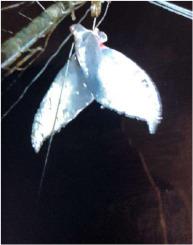Legal perspectives on unintended and unsanctioned humpback whale entanglement in the South Atlantic trawl fishery
IF 4.8
2区 环境科学与生态学
Q1 OCEANOGRAPHY
引用次数: 0
Abstract
Whale interactions with fishing gear pose a major anthropogenic threat, yet entanglements in South Atlantic trawl fisheries remain underreported, with no published records. This lack of data extends to reports of whales found stranded with amputated tails, despite documented cases of survival even without a fluke. This study presents a novel case: a video recorded in May 2020 captured a shrimp trawler in Santa Catarina, Brazil, entangled with a humpback whale (Megaptera novaeangliae). Vocalizing and bleeding, the whale had recently lost its fluke and remained caught in the vessel's gear. Following the video's public outcry, authorities identified and apprehended the responsible vessel, conducting a thorough investigation. Although initial sanctions were issued, and evidence confirmed illegal fishing practices and neglect towards the whale, subsequent legal proceedings deemed the act unintentional and acquitted the involved parties. This report seeks to not only document this unprecedented case but also to analyze why such infractions against cetacean often receive minimal legal consequences. Examining this case within the context of broader policy and enforcement frameworks, we discuss potential explanations for the perceived low legal severity of such incidents and argue for the need for enhanced legal accountability to effectively protect marine mammals in the South Atlantic.

从法律角度看南大西洋拖网渔业中无意和未经许可的座头鲸缠绕事件
鲸鱼与渔具的互动构成了重大的人为威胁,但南大西洋拖网渔业中的缠绕事件仍未得到充分报告,也没有公开记录。尽管有记录表明鲸鱼即使在没有鳍的情况下也能存活,但这种数据缺乏的情况还延伸到鲸鱼被发现搁浅并截尾的报告。本研究提出了一个新的案例:2020 年 5 月录制的一段视频捕捉到巴西圣卡塔琳娜的一艘拖虾船与一头座头鲸(Megaptera novaeangliae)缠绕在一起。鲸鱼发出声音并流血,它最近失去了鳍,但仍被渔船的渔具缠住。在视频引起公众强烈抗议后,当局查明并逮捕了肇事船只,并进行了彻底调查。虽然最初的处罚已经下达,证据也证实了非法捕鱼行为和对鲸鱼的忽视,但随后的法律程序认为该行为并非蓄意,并宣判涉案方无罪。本报告不仅要记录这起史无前例的案件,还要分析为何此类针对鲸类的违法行为往往只承担极小的法律后果。通过在更广泛的政策和执法框架下研究这一案例,我们讨论了此类事件被认为法律严重性较低的潜在原因,并认为有必要加强法律责任,以有效保护南大西洋的海洋哺乳动物。
本文章由计算机程序翻译,如有差异,请以英文原文为准。
求助全文
约1分钟内获得全文
求助全文
来源期刊

Ocean & Coastal Management
环境科学-海洋学
CiteScore
8.50
自引率
15.20%
发文量
321
审稿时长
60 days
期刊介绍:
Ocean & Coastal Management is the leading international journal dedicated to the study of all aspects of ocean and coastal management from the global to local levels.
We publish rigorously peer-reviewed manuscripts from all disciplines, and inter-/trans-disciplinary and co-designed research, but all submissions must make clear the relevance to management and/or governance issues relevant to the sustainable development and conservation of oceans and coasts.
Comparative studies (from sub-national to trans-national cases, and other management / policy arenas) are encouraged, as are studies that critically assess current management practices and governance approaches. Submissions involving robust analysis, development of theory, and improvement of management practice are especially welcome.
 求助内容:
求助内容: 应助结果提醒方式:
应助结果提醒方式:


